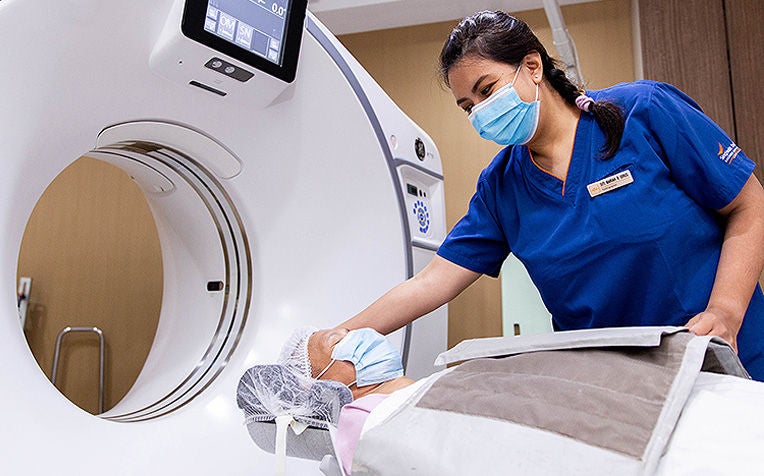
CT scans use X-rays, while MRI scans use magnetic fields and radio frequency waves.
From the outside, both MRI (Magnetic Resonance Imaging) and CT (Computed Tomography) scanners look alike — large, white, doughnut-shaped machines that scan patients while they lie down. So what are the differences between the two? Radiographers from the National Neuroscience Institute (NNI), a member of the SingHealth group, explain the differences and share tips when preparing to go for a scan.
| | CT Scan | MRI Scan |
|---|---|---|
| How does it work? | Uses X-rays | Uses magnetic fields and radio frequency waves |
| How long does it take? | 5-15 mins | 45mins to 2 hours |
| Is contrast needed? | Sometimes, depending on type of test ordered | Sometimes, depending on type of test ordered |
Contrast is a special dye that is injected into veins on the arms or hands to improve the image quality and aid diagnosis. Alert staff if you have previously had an allergic reaction to contrast. Your doctor will order a CT or MRI scan based on your suspected or confirmed diagnosis.
Money matters and MEDISAVE
The cost of CT and MRI scans varies, depending on the number and type of tests ordered by the doctor. You can claim from your MediSave account to help cover the cost of your scan, subject to withdrawal limits. There are annual limits, so if you have had scans done at other hospitals during the calendar year, you may not be able to use MediSave for scans done.
5 Golden rules when going for an MRI or CT scan
 1. Know if you are pregnant or not
1. Know if you are pregnant or not
Tell a member of staff before the scan, as X-rays can harm your unborn baby. If you are unsure, you will need to take a pregnancy test before the scan can be done.
 2. If you are under 21 years old...
2. If you are under 21 years old...
Your parent or legal guardian must accompany you for your appointment as they will need to give consent should you need a contrast injection (except for National Service men).
 3. Keep still throughout the scan
3. Keep still throughout the scan
Movement causes blurred images — if this occurs you may need to repeat the scan, resulting in more radiation (X-rays).
 4. A contrast injection may be needed
4. A contrast injection may be needed
You may need a contrast injection with your scan — this may cause a warm feeling in the chest and abdomen, as well as a metallic taste in the mouth, that lasts a few seconds. On the other hand, some people feel nothing at all!
 5. If you had an allergic reaction before for a previous scan...
5. If you had an allergic reaction before for a previous scan...
Tell a member of the staff if you have had an allergic reaction to contrast during a previous scan.
To learn about must-remember information about MRI scans, hit the link.
Ref: K21
Check out other related articles:
MRI Scan: What Is the Procedure?
COVID-19 Vaccine Myths Busted!
Contributed by
















 Get it on Google Play
Get it on Google Play